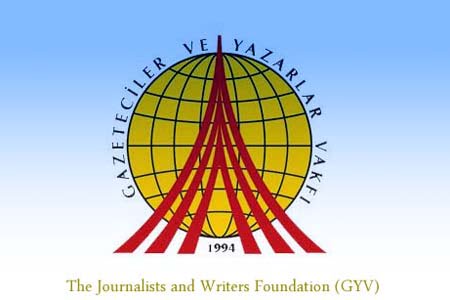GYV urges government to accelerate reforms in favor of media freedoms

Date posted: April 17, 2013
The foundation released a statement on Wednesday regarding recent debates in Turkey concerning freedom of the press, expressing its concerns and recommendations on the issue.
The statement read, “The fact that Turkey’s democratization efforts are overshadowed by developments that are incompatible with freedom of the press damages Turkey’s image in the international arena.”
“Removing limits on freedom of the press and freedom of expression and problems caused by these limits in Turkey depends on speeding up pro-freedom reforms and bringing Turkey’s legislation in line with European Union norms. In this regard, in particular the Press Law, the Counterterrorism Law [TMK] and the Turkish Penal Code [TCK] should be made compatible with international laws and the European Convention on Human Rights [ECHR],” the GYV said.
Stating that freedom of the press and freedom of expression are indispensable rights in democratic societies, the statement recalled that these principles are also among the fundamental aspects of the Universal Declaration of Human Rights and the ECHR, to which Turkey is a party. “It is a requirement in a democracy that expressing marginal thoughts should also be possible within international norms unless they contain violence, hatred or insults,” the statement said.
The GYV’s statement also voiced disapproval of any pressure on the media. “All kinds of practices like political pressure, business relations and self-censorship which limit freedom of the press are against democracy and are unacceptable. The commercial affairs and governmental ties of media owners should not limit freedom of the press,” the GYV said.
The statement underlined that political actors putting pressure on the media and media owners acting in line with this pressure and prioritizing their business interests both constitute interventions into the freedom of the press. “Journalists should adopt a stance defending the dignity and principles of the profession,” the statement said, adding that full implementation of freedom of the press is linked to a pro-democracy stance from both politicians and the media.
On the other hand, the statement also stressed that freedom of expression should not create a space for actions that aim to eradicate democracy in the country, noting that press freedom would never grant journalists immunity from laws. “Yet, this limitation should be put into practice with such attentiveness that journalists acting in line with freedom of expression and principles of the profession should not be victimized,” the statement added.
The statement has found extensive support among media members. Veteran journalist Hasan Cemal, who was fired from the Milliyet daily in March when one of his articles was not published by the newspaper, endorsed the GYV statement. Cemal’s rejected article was on the relationship between the media and government and included criticism of this relationship.
Prior to that, a controversy took place between Hasan Cemal and Prime Minister Recep Tayyip Erdoğan when Milliyet published the secret minutes of a meeting between terrorist Kurdistan Workers’ Party (PKK) leader Abdullah Öcalan and Kurdish deputies in the beginning of March.
In response to efforts to link Cemal being fired and Erdoğan’s statements, the prime minister denied claims of pressure on the owner of Milliyet, the Demirören family, which has strong links to industry. “It is said that I, as the prime minister, put pressure on the Demirören family [which owns Milliyet]. … I am offended by claims that I demanded Cemal stop writing articles for the daily,” said Erdoğan.
However, he also had stated that when the Demirören family bought the dailies Milliyet and Vatan, the owner, Erdoğan Demirören, had asked him whom he would recommend as editor in chief. Erdoğan had said that he recommended Akif Beki, but he was not appointed as the newspaper and Beki were unable to reach an agreement.
Following the GYV’s statement, Cemal described the statement as “very good” on his Twitter account.
In addition to the case of Cemal, at the beginning of April Habertürk columnist and Turkey correspondent of the Economist Amberin Zaman parted ways with the Turkish daily at the request of the owner of the newspaper. Her dismissal from the newspaper was also widely discussed on the social media and considered as a blow to media freedoms in Turkey.
The GYV was founded in 1994 with the mission and work of the foundation inspired by GYV Honorary President Fethullah Gulen. Gulen, a well-respected Turkish intellectual and Islamic scholar, is known for his teachings of “hizmet” (service), tolerance and dialogue.
Since its foundation, the GYV has advocated democracy, plurality, peace and the art of living together, largely through organizing countless conferences and panels.
Click for here for the full statement of the GYV
Source: Today’s Zaman, 17 April 2013
Tags: Freedoms | Hizmet and media | Journalists and Writers Foundation | Turkey |
























